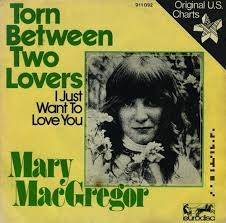Cover versions
In 1977, Gracie Rivera recorded "Torn Between Two Lovers" as the first track for her debut album, Gracie. The song became a hit with Hongkongers and carved her name in their music scene in the '70s.
"Torn Between Two Lovers" has also been recorded by Johnny Rodriguez for his 1977 album Practice Makes Perfect, Anna-Lena Löfgren for her 1979 album Lev Som Du Lär and Anita Meyer for her 1984 album Face to Face. Connie Francis recorded "Torn Between Two Lovers" for her 1989 album release Where the Hits Are which was recorded at Muscle Shoals Sound Studio and contained a number of songs whose original versions were Muscle Shoals recordings. Sharon Cuneta recorded her version for her album Isn't It Romantic Volume 2 in 2007. Joey Sontz recorded his version for his debut album Chasing the Dream in 2012.
"Torn Between Two Lovers" has been rendered in a number of languages, including Cantonese, "中間人" by Faye Wong from the album Shirley Wong ; German, "Zwischen zwei Gefühlen" by Penny McLean; Portuguese, "Só, entre dois amores" by Celly Campello (pt); Dutch, "Hulpeloos verloren" by Conny Vandenbos; French, "Drame entre deux amours" by Claude François; Swedish, "Ge mig dina tankar" by Wizex; and Spanish, "Entre dos amores" by Christie Lee.
The song was mentioned in the lyrics of Dolly Parton's 1984 country single "God Won't Get You".
This page is based on this
Wikipedia article Text is available under the
CC BY-SA 4.0 license; additional terms may apply.
Images, videos and audio are available under their respective licenses.
